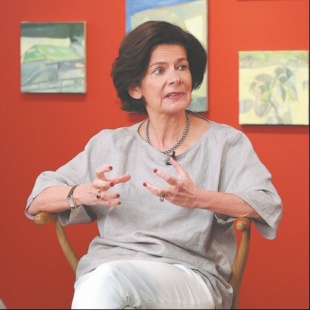A celebration of civilizations
French writer and curator in Beijing joins a salon with a Chinese cellist trained in France to discuss how art, literature and music translate beyond the cliche of 'universal languages' to traverse intercultural intersections, Erik Nilsson reports.

Defining distinctions
Ultimately, the salon about exchanges between the two societies, in particular, and human universalisms, in general, proceeded to scrutinize the definitions of, and distinctions between, civilization and culture.
"For me, civilization is not only one culture, one country," Cayol says.
"Western civilization is many different cultures. Italian culture, French culture, German culture — are all unique, are different. But, of course, those common points can shape what we call Western civilization. And I would say, Asian civilization, it's a way to mix Chinese culture and different cultures. Civilization is made of this huge, whole, comprehensive way of gathering cultures," she explains.
"Culture is memory. You remember all the works, all the artworks of the past … 100 years ago, 1,000 years ago, and it still remains a very current, dynamic and modern thing. It's about past and present."
Chu views the question through the lenses of his time in China, Europe and the United States.
"It's not which culture has priority, what civilization is right or wrong. It's just the ability to think differently."
All ears
Chu believes listening is crucial to understanding among cultures and civilizations.
"As a musician, I have a huge privilege because music is not an art of speaking. Music is an art of listening," he says.
"If we have the need to have a better understanding between us, the first instinct should not be speaking. The first instinct should be listening. Maybe me first, maybe you first, but somebody should first listen."
Cayol points to the value of meeting in person. That's why she brings French artists to China to experience Beijing for themselves.
"We can talk about very big concepts and directions, but in fact we need to listen to each other. And how do we listen to each other? Again we need to go and to discover: What does it mean, Chinese culture? What does it mean, living in France?" she says.
"Social media plays a key role to spread a lot of wrong ideas about life in China or in France. So, again, artists, they have the key."
Before pulling out his cello, Chu says: "Many people think about listening. No. We don't know how to listen. Listening is not only through ears. It's with your heart, with your mind. We learn through music how to listen."
Then, he played. And everyone listened.





































